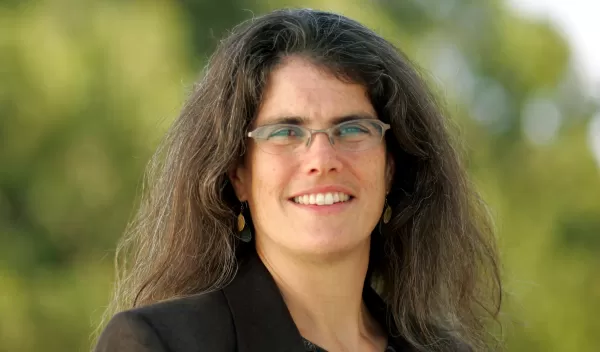
After the Lecture...
We sat down with UCLA's Andrea Ghez after her recent talk on "Unveiling the Heart of the Galaxy" as part of the NSF Distinguished Lectures in Mathematical and Physical Sciences. A few minutes later, we were probing the connection between ballet and astrophysics and why sometimes being outside of mainstream science can offer a scientist creative license that seeds transformational research.
I was not a science fiction buff. I was always a puzzle buff, and I absolutely loved math. I still think of my job as puzzle solving. As a child, I also was fascinated by stories of women explorers--my favorite was Amelia Earhart.
At some point in high school, I got fascinated by the concepts of black holes and the beginning of time.
It's asking the biggest questions we can possibly ask. It's understanding our position in the universe. It's what makes us uniquely human--to try and understand our context in the biggest possible terms. It's what inspires us.
Adaptive optics has transformed what we can do. When we started with speckle imaging, it was this bizarre little technique only a few people knew how to do. It was a niche-like a boutique technique. Adaptive optics has opened up the world of science so we can ask a much richer set of questions. It's made it a technique for every astronomer.
I used to be tremendously afraid of public speaking. I would shake if you asked me to introduce myself. I chose grad school for places where I would not have to teach because I was so deathly afraid of getting in front of an audience. But my adviser made me give a lunchtime talk, and every bone in my body shook. He was sweet but said I needed to teach. I've always been strongly committed to encouraging young girls to go into science, so I figured if I was going to teach, I would do it in a meaningful way for me. You just can't get nervous every day, and I learned how to translate nervousness into excitement. That becomes your style. You are no longer nervous.
I haven't seen Interstellar. It's on the top of my why-haven't-I-seen-it list.
You're basically an idiot until you prove you're smart. That's what it's like to be in science.
My approach has always been to give myself the highest credentials possible. So when I thought about where to go to school, I really did think about the school that would give me the best "coat of armor" for dealing with any doubt. At every stage of my career, I think there's been someone who pipes up with "you've only done this because you're a woman" comment. And it's not like everyone says this. It's just that that's the one comment you listen to.
It's really important to pick a good mentor. I think this is true, independent of gender.
I almost increasingly think that there is an advantage to being outside mainstream because a lot of progress in science comes from the ability to think differently and to not necessarily accept what everyone has put out there. If you propose something different from what people are doing, how comfortable are you with being outside the group?
To do science, it's so important to take risks and accept failure. How do you train your students to do that? It's a very important characteristic.
I was really interested in dancing when I was young; I wanted to be a ballerina. At one point I got more interested in choreography. For some reason, I now think of my work as this combination of puzzle solving and choreography. I would never have made the connection between that kind of thinking and what I do today, yet it's totally there.
There have definitely been moments where I felt like I'm not playing on the right playground because I'm not seeing anyone I can relate to. Meeting people you can relate to is remarkably powerful and sometimes you find those people who inspire you to go onto the next step in very unexpected places.
I think if I were not a physicist, I'd be some other sort of scientist or mathematician who is focused on solving problems.
